“The best business presentation I’ve ever seen; you were fabulous!”
~Audience Member
Tim Root, Venture Catalyst at SOREDI, launched this month’s Pub Talk in the Ballroom of the Ashland Springs Hotel by naming the entities involved in the Pub Talk Series: SOU, SBDC, City of Ashland, and SOREDI; these partners are working together to create a program to help entrepreneurs in the Rogue Valley make their businesses work. The Pub Talk Series is the starting point for this effort.
Tim then introduced Frederick Schilling, founder of Dagoba Chocolate: a sweet success!
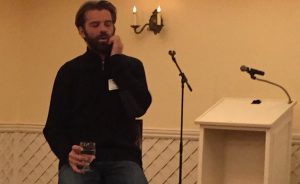
As he sat on a bar-height chair in front of a rapt audience of around 50 local entrepreneurs, Frederick began relating the story of his journey to educate the consumer about the source of their food and, in the process, deliver the finest possible organic chocolate bars.
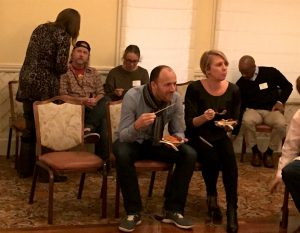
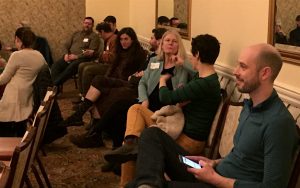
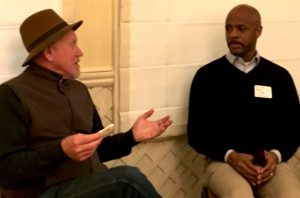
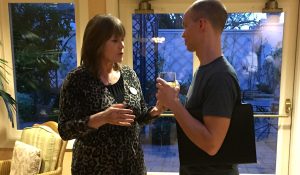
Frederick began his business venture—like most culinary entrepreneurs—by hand-crafting his product in his home kitchen, and doing his own marketing and selling to local stores. As his volume grew, he realized that he needed a commercial manufacturing facility and initially chose Boulder, Colorado. He eventually relocated to Southern Oregon because he liked the environment and the environmental enthusiasm in our area. (And, he was forced to wait more than 10 seconds for the traffic lights to change in Boulder.)
During the first five years, the business grew dramatically—and was noticed by multiple suitors. Frederick finally accepted an offer from Hershey in 2006. After a year or so, he became bored with the Corporate Pace and returned to entrepreneurial life, transitioning to another food group: sugar. He is currently a co-owner of Big Tree Farms, based in Ashland; they produce Coconut Sugar, the latest healthy sweetener.
The story behind Dagoba Chocolate…
Despite being raised in an entrepreneurial family, youthful wanderlust won out and, in his early twenties, Frederick was charmed by the spiritual teachings of Eastern religions and the music of his time. He entertained the idea of becoming a Buddhist Monk in a monastery. He attended college—until he vacationed in Telluride, Colorado during one semester break, and gradually put down roots, spending his time mountain biking, climbing, and playing music in bands. He ended up staying in Telluride for seven years. Then he moved to Boulder, Colorado.
Inspiration Struck…
The inspiration for Dagoba was based in Frederick’s passion for natural foods, nurtured by his mother Mary.
One summer, while he was attending a family reunion, he announced his brainstorm to his family; they loved the idea enough to invest $20,000 in his venture, and the Dagoba Chocolate business was launched.
No formal business background…
Keep in mind that Frederick had no formal business background; only that which he had absorbed while growing up in a family of entrepreneurs.
He bought his first computer in 1999 and opened a Compuserve account. He began writing his first business plan, and was in awe of the process; he described the process as “mindblowing.” All he wanted to do was write business plans and tweak the details.
On the production side, he started off by hand-pouring every chocolate bar—with help from his mother, Mary; his father, Jon; and his sister, Becky.
Core Passion…
Frederick expressed that his business is really about extreme transparency to the consumer about the origin of cacao. That, in combination with his love affair with religion—how we humans perceive The Divine—brought him to study the Mesoamerican culture. He believed cacao to be a sacred food, and was fascinated by the origin, history and lore of the cacao bean. He fell in love with the idea of being able to educate the consumer about the source of their food—and the farmers who grow that food. He wanted to elevate the point at which the chocolate industry was positioned; this was in 2000.
While based in Boulder, Frederick spent a lot of time traveling and building supply chains.
Moving to Southern Oregon
Boulder eventually became too crowded for his temperament, so he relocated to Ashland in 2002 and opened the first Dagoba Chocolate factory in Central Point.
Frederick related that the company’s primary intent was to not compromise their ideals and, “when you have that constantly in mind, you are going to be hitting the hurdles, because you have to figure out ways to navigate the systems that are already set up.” The gambles included box makers who were resistant to using 100% recycled paper and soy-based ink. The box maker eventually got with the program and retrofitted some of their equipment to accommodate the request for the 100% Post Consumer Waste Paper and Soy-Based Ink.
Q: It’s rare to find organic ingredients in Hershey’s products (produced prior to around 2014.) Did you have any challenges getting Hershey’s to go organic?
A: Hershey’s Social Responsibility is incredible but they don’t tell their story well. Milton Hershey was a Mennonite, and part of the Mennonite philosophy is: Give Back. Hershey was a very successful entrepreneur who started a caramel company and then sold the company in 1890 for one million dollars [translates to around 25 million 2017 dollars]. Milton and his wife were unable to have children, so he used the proceeds to start a school that provided free room and board for underprivileged children. Hershey’s eventually adopted the organic philosophy. [NOTE: Merging Dagoba Chocolate into their product line must have had an impact on Hershey’s Kitchen because they recently introduced a whole line of non-GMO Products.]
The Brand Name is so important!
Frederick selected a brand name that projected the reverence he feels about his product.
Q: How did you come up with the name Dagoba?
A: Dagoba essentially means “temple” in Sanskrit; short for Dhatu-Gharba which, literally-translated is “from the universal waters, all things come forth.” The point is: each bite is intended to be a personal religious experience.
Dagoba is presented at the 2004 New York Fancy Food Show
After growing his company for a couple of years, Frederick decided to get a booth at the New York Fancy Food Show, where foods from all over the world are exhibited. At that trade show, Frederick’s mother dragged him over to the Big Tree Farms booth, where they were promoting Sea Salt, Peppercorns and Honey. Serendipity! Turns out that Frederick’s current business partner, Ben, was the owner of that booth. The Big Tree Farms packaging was the attraction: hollowed-out coconuts.
Fast forward a year, to the Fast Food Expo in Anaheim, California. Frederick again brought Dagoba Chocolate to the show. A mutual acquaintance, Shelly Martin, introduced Frederick to Ben Ripple, the owner of Big Tree Farms (who happens to live on Bali and is a backpacker.)
Ben works with impoverished farmers to bring their products to market. Frederick works with farmers to bring transparency to consumers. What a match! What a partnership!
Key pieces fall into place…
According to Frederick, and in line with the experience of every inventor, there’s no Golden Idea. A service or product will succeed if the service or product solves a problem for the consumer.
Around the time that Frederick met Ben at the Fast Food Expo, Coconut Sugar was making news for its low glycemic properties. [The sugar is made from the flower blossom of coconut nectar. One tree produces up to three liters of fresh nectar per day, every day, for 12 months of the year; trees literally pump-out nectar.] But: the Coconut Sugar market is a cottage-level industry; farmers harvest and refine the raw material in their back yards.
Frederick thought: If we look at the trends of where the consumer is going with their diets, the trend is towards healthy eating.
At the time, Coconut Sugar wasn’t even known outside Southeast Asia. Bam! The light went on! Any diabetic or health-conscious consumer would be interested. It’s an all-natural whole sweetener.
But here’s the challenge: How does one harvest this crop and bring the end product to market on an industrial scale? And in a way that the process can be scaled and shipped out to an international market?
While Coconut Sugar has been around for thousands of years, harvesting the crop is like walking around Ashland and picking up acorns to make acorn flour—acorns are everywhere.
Frederick and Ben figured out how to industrialize this crop.
Coconut Sugar is Born.
Frederick and Ben started thinking about how they could bring this product to an international market; building a supply chain, proving the supply chain, building-out the infrastructure, building the factories to produce the product at a scale that nobody has done before. And then, how do you build a market for it? What do you call it? In Indonesia, they call this sugar Gula Merah. You can’t launch a product in the U.S. called Gula Merah. So, Coconut Sugar was born.
In 2010, about a year after they launched the business, the Dr. Oz TV Show dedicated half an episode to the benefits of Coconut Sugar, calling the sweetener “the best alternative to Cane Sugar.” Big Tree Farms was positioned to capitalize on this exciting “new” sweetener.
Big Tree Farms’ Coconut Sugar is now in Costco and Sam’s Club.
It takes a lot of work to build a company.
Throughout his presentation, Frederick stressed the amount of work involved in building a company.
Q: How do we grow this type of company in “little old Ashland”?
A: Accomplishing this feat in a larger metropolitan area is probably easier because of the existing, ubiquitous infrastructure and supply chain links; however, you must then deal with traffic and other challenges that come with living in large cities. He loves his life here!
The success of your company depends on your team.
It’s the execution that is the most difficult part of a business and, for that, you need a team. His childhood experience playing La Crosse taught him the value of teamwork.
Frederick praised his team; both the individuals and their interaction.
The Whole Package.
Q: What were the elements of your business that were most valuable when your company was being courted? Distribution? Cacao sources? Marketing?
A: All of it. The whole package.
Big Tree Farms’ Coconut Sugar is available at the Ashland Food Co-Op and Shop ‘n’ Kart.
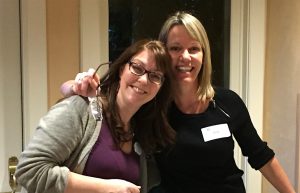
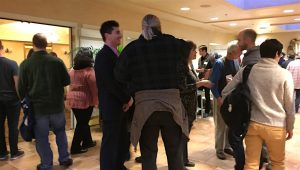
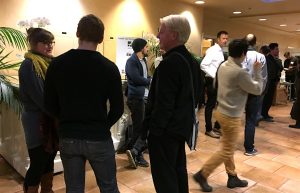
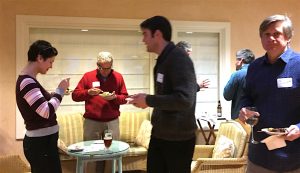
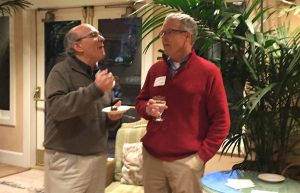
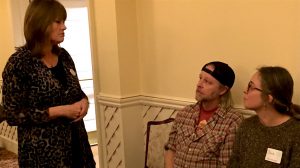
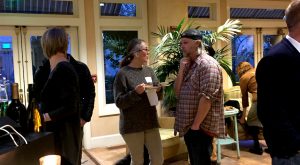
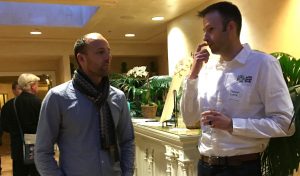
Three Minute Pitches
Following Frederick’s presentation, three entrepreneurs stepped up to take advantage of the Three-Minute Pitch Segment: Benjamin Frederick from Hydro Hammock (a hot tub in a hammock) updated us on recent company changes, including recent hiring of a new CEO/CFO, BuzzFeed news, new hires, investment opportunities, new products; Russ Dale, from Russ Dale Properties is looking for someone to take over his affordable housing project for veterans, due to personal health issues, and you may contact Russ at: Russ -AT- rdpmedford.com; Jakob Schillinger of One Dollar Glasses, an organization that invented a machine that makes glasses for people in developing countries and teaches those folks how to manufacture—and sell—their own products talked about his organization’s success. Jakob travels the world to spread the word about how people in developing countries can be self-sufficient with a bit of help and training.
Join Us! Tuesday, March 14, 2017, 6:00 p.m. at the Ashland Springs Hotel Ballroom for the next SOREDI Pub Talk!
Author: Karen
Written: 2/10/17
Published: 2/10/17
Copyright © 2017, FPP, LLC. All rights reserved.